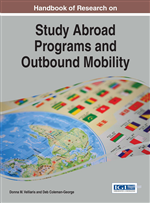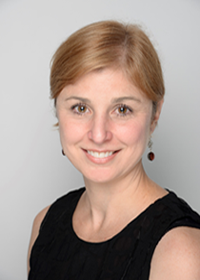Internationalization continues to be on the agenda of higher education providers worldwide and study abroad offers opportunities for both faculty and students to contribute to the world, while also being shaped by it. Dr. Donna Velliaris, an esteemed editor/author of publications, Handbook of Research on Study Abroad Programs and Outbound Mobility and Study Abroad Contexts for Enhanced Foreign Language Learning, and contributor of 30 IGI Global book chapters, dives into a discussion on study abroad programs; building and establishing authentic links between institutions, and making internationalization real and meaningful for wider society.
 Scholars use a typology of terms for short-term study abroad, including but not limited to; academic internships; bilateral student exchanges; education or semester abroad; extended field trips; faculty-led tours; field or area studies; intersession or immersion programs; integrated university studies; international clinical and practical preservice training; internships or co-op; mentored travel; project-based and service-learning placements; school exchanges; and/or travel seminars.
Scholars use a typology of terms for short-term study abroad, including but not limited to; academic internships; bilateral student exchanges; education or semester abroad; extended field trips; faculty-led tours; field or area studies; intersession or immersion programs; integrated university studies; international clinical and practical preservice training; internships or co-op; mentored travel; project-based and service-learning placements; school exchanges; and/or travel seminars.
In general, study abroad programs involve relatively small groups of students embarking on a short two-week to two-month period of study overseas, perhaps at a ‘partner’ institution, which offers such advantages as a short(er) time commitment, lower costs, greater administrative ease, and/or meets certain objectives related to an important facet(s) of the higher education (HE) curriculum without disrupting normal semester periods.
Increasingly, tertiary students need to be prepared for a global work environment and Higher Education Institutes (HEIs) have a duty to meet the growing demand for study abroad opportunities that are inclusive of traditional, non-traditional, and first-generation cohorts. Proponents stress a number of ‘positive’ outcomes or key competencies for those undertaking a study abroad venture, including marketable skills such as: accepting international values and beliefs; adapting behavior; building confidence; communicating across cultures; deepening learning and inspiring rigor; detecting ethnocentrism; encouraging solidarity; engaging in active observation; enhancing civic-mindedness; facilitating intellectual growth; fostering empathy; increasing self-awareness; practicing reflexive understanding; preventing stereotypes and prejudice; showing cultural humility; and tolerating ambiguity.
Principally, there needs to be an ‘educative’ connection between ‘home’ and ‘host’ destinations/organizations for advancing HE teaching and learning opportunities. That is, the more relevant the international experience is to the overall educational objectives of the degree program/specific course, the more students will benefit. And, while these programs should be ‘enjoyable’, they should not be promoted or viewed as an ‘easy study option’ or ‘time-off’. Studying abroad is not a vacation, and a vacation is not synonymous to study abroad. The legitimacy of study abroad is linked with fulfilling major/minor and/or elective requirements that students would take even if they had remained at their ‘home’ institution.
Imagine studying music in Vienna, fashion design in Paris, and intensive Arabic in Rabat, Morocco.
Or, learning traditional and non-traditional fine arts on the Greek island of Paros. Acquire new skills in textiles and find inspiration that can be applied to fabric, accessories, and furnishings in Accra, Ghana.
Spend two-weeks in London, while examining the works of British fantasy literature.
Visit the culture, history and literary tradition that inspired famous fantasy works such as Harry Potter and the Sorcerer’s Stone, and The Lion, the Witch, and the Wardrobe.
Live aboard a catamaran sailboat in the British Virgin Islands, while being immersed in marine science and mastering practical skills that are needed for the toolbox of any aspiring aquatic biologist. Partake in a short-term sustainable development project in Ecuador, where students converge on a biodynamic grassroots farm in rural South America to learn about permaculture, biodiversity, and conservation. Or, get hands-on in all facets of wildlife capture and procedures on a three-week course, managed by local wildlife veterinarians in South Africa.
Consider a program for midwifery, nutrition and pharmacy students with a unique work-integrated learning opportunity in Tonga, as well as in Samoa, where students can study health and wellness in the South Pacific. Relish in Germany’s musical tradition with the chance to refine one’s technique under the tutelage of professional performing artists. In Shanghai, step back in time with visits to traditional water towns like Wuzhen and Zhujiajiao, lined with narrow cobbled lanes, stone bridges, and rich history. Or, visit the Pokhara Valley in rural Nepal to help rebuild, educate, and assist the children within the Nepali community.
Indeed, these global encounters can facilitate a clearer sense of personal and professional purpose, i.e, vision and ambition that may otherwise have been overlooked by staying domestic. Nevertheless, the decision to lead (faculty) and/or participate (student) in short-term study abroad is not always straightforward. Since the happenings of such programs are many and varied—not always comfortable or even positive—one must consider commonality of language; geographic location; healthcare facilities; ideological affinity; political interests; racial tolerance; reputation; safety; security; and social atmosphere. Even then, study abroad can evoke a myriad of emotions… Happy. Sad. Excited. Homesick. Independent. Lonely. Inspired. Exhausted. Energized. Shocked. Thrilled. Ill. Lost. Confused. Entertained. Bored. Accepted. Rejected. Annoyed. Content. Frustrated. Tired. Embarrassed. Overwhelmed. Free. Happy. Sad...
IGI Global would like to thank Dr. Velliaris for her valuable research along with the time she has given for this article, as well as in the chapters and books she has published over the years. For more information, be sure to check out Dr. Velliaris's publications here and recommend them to your library. Her forthcoming publication to be released early 2019 is titled: Prevention and Detection of Academic Misconduct in Higher Education.
All of these titles and over 900 education titles are also featured as part of IGI Global’s world-renowned InfoSci®-Books, a collection of 4,500+ e-books with over 93,000 chapters and over one million reference citations. Offered as low as US$ 8,580 US$ 6,864*, this database hosts key features such as full-text PDF and HTML format, no DRM, unlimited simultaneous users, and no embargo of content (research available months in advance of the print release). This comprehensive collection spans 11 core subject areas, including business and management, computer science, education, engineering, social sciences and humanities, and more. Purchase or recommend this database to your institution’s librarian.
About Dr. Donna Velliaris
 Donna M. Velliaris is currently living and working in Singapore while her two young children attend an international school. A fully qualified [Australia] secondary school educator since 1995, she has a total of 12 officially registered subjects/skills across Grades 8-12. To date, she has taught students from Reception to PhD level and across several continents. Dr Velliaris holds two Graduate Certificates: (1) Australian Studies; and (2) Religious Education, two Graduate Diplomas: (1) Secondary Education; and (2) Language and Literacy Education, as well as three Master’s degrees: (1) Educational Sociology; (2) Studies of Asia; and (3) Special Education. In 2010, Dr Velliaris graduated with a PhD in Education focused on the social/educational ecological development of school-aged transnational students in Tokyo, Japan.
Donna M. Velliaris is currently living and working in Singapore while her two young children attend an international school. A fully qualified [Australia] secondary school educator since 1995, she has a total of 12 officially registered subjects/skills across Grades 8-12. To date, she has taught students from Reception to PhD level and across several continents. Dr Velliaris holds two Graduate Certificates: (1) Australian Studies; and (2) Religious Education, two Graduate Diplomas: (1) Secondary Education; and (2) Language and Literacy Education, as well as three Master’s degrees: (1) Educational Sociology; (2) Studies of Asia; and (3) Special Education. In 2010, Dr Velliaris graduated with a PhD in Education focused on the social/educational ecological development of school-aged transnational students in Tokyo, Japan.
Her primary research interests include: human ecology; Third Culture Kids (TCKs); schools as cultural systems; and study abroad. With recent publication of almost 30 book chapters, titles comprise: Academic reflections: Disciplinary acculturation and the first-year pathway experience in Australia [Garnet]; Conceptualizing four ecological influences on contemporary ‘Third Culture Kids’ [Palgrave Macmillan]; Culturally responsive pathway pedagogues: Respecting the intricacies of student diversity in the classroom [IGI Global]; The other side of the student story: Listening to the voice of the parent [Sense]; and Metaphors for transnational students: A moving experience [Cambridge Scholars].
Publisher’s note: This article was written by Dr. Donna Velliaris on the benefits of study abroad programs for students. The following work does not reflect the views of IGI Global.
Newsroom Contact
Caroline Campbell
Marketing Manager
ccampbell@igi-global.com
(717) 533-8845, ext. 144
www.igi-global.com/
*InfoSci-Books $6,864 annual subscription price is only available for new InfoSci-Books subscriptions and cannot be combined with most offers or multi-site use.